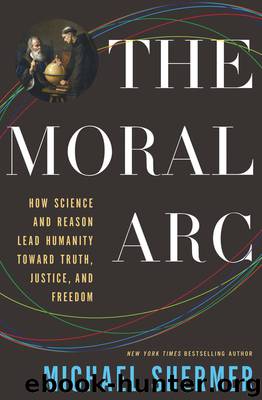The Moral Arc: How Science Makes Us Better People by Michael Shermer

Author:Michael Shermer [Shermer, Michael]
Language: eng
Format: epub
ISBN: 9780805096934
Publisher: Henry Holt and Co.
Published: 2015-01-19T20:00:00+00:00
PROVISIONAL MORAL PRINCIPLES FOR ANIMALS
Let’s consider the Provisional Ten Moral Principles that I outlined at the end of chapter 4. The first two principles—the Golden Rule Principle and the Ask-First Principle—might apply to animal rights by asking ourselves how our actions with regard to other species affect their capacity to survive and flourish. We can imagine how we might feel if we were, say, a chimpanzee locked up in a cold steel cage injected with human diseases. We might visualize ourselves as dolphins frolicking about a cove when all of a sudden a machete cuts through the water and slashes us open to bleed to death. Or we might picture being a head of cattle, taking our final walk down our own green mile, hearing our comrades falling one by one, and think of what Ted Conover was told by a worker at a factory farm slaughterhouse about the cattle and imagine that they are us: “We’re scared. We don’t want to die.”88
In so identifying with other species and taking their perspective, we might find a way to apply the Happiness Principle and the Liberty Principle in which we should never seek happiness and liberty when it leads to the unhappiness and loss of liberty of another sentient being. Recall that Principle 5, the Fairness Principle, is based on John Rawls’s concepts of the “veil of ignorance” and the “original position,” in which we are ignorant of our position in society when determining rules and laws that affect everyone, so imagine this applied to ourselves as sentient beings not knowing if we would be born as a farmer or a farm animal. Given what we know, which farm would be fairest, a family farm or a factory farm? In most cases, the former.
Continuing through the Provisional Principles, the Reason Principle would imply that we should reason our way toward rational choices about the foods we eat and the animals we use (for hunting, recreation, or pets), opting when possible for food products from companies that consider animal welfare and the environment, or hunting organizations such as Ducks Unlimited that aim for species conservation, or pets from rescue shelters instead of pet mills. Principle 8, the Defend Others Principle, applies not only to children, the mentally ill, the old, and the handicapped, but to domesticated animals as well, especially since we purposefully bred out of them their natural capacity for surviving on their own in the wild. Principle 9 is worded for inclusion of animals in our expansion of the moral sphere for sentient beings worthy of moral consideration, and Principle 10, The Biophilia Principle, would apply to all plants and animals, along with the air and water, in terms of creating a sustainable environment for untold generations of human and nonhuman animals still to come.
Download
This site does not store any files on its server. We only index and link to content provided by other sites. Please contact the content providers to delete copyright contents if any and email us, we'll remove relevant links or contents immediately.
Enlightenment Now: The Case for Reason, Science, Humanism, and Progress by Steven Pinker(7305)
A Journey Through Charms and Defence Against the Dark Arts (Harry Potter: A Journey Through…) by Pottermore Publishing(4798)
The Immortal Life of Henrietta Lacks by Rebecca Skloot(4571)
A Journey Through Divination and Astronomy by Publishing Pottermore(4377)
Elon Musk by Ashlee Vance(4120)
Origin Story: A Big History of Everything by David Christian(3680)
COSMOS by Carl Sagan(3617)
Alchemy and Alchemists by C. J. S. Thompson(3510)
Bad Pharma by Ben Goldacre(3420)
Enlightenment Now by Steven Pinker(3365)
Shadow of Night by Deborah Harkness(3356)
Inferior by Angela Saini(3311)
A Mind For Numbers: How to Excel at Math and Science (Even If You Flunked Algebra) by Barbara Oakley(3294)
Origin Story by David Christian(3192)
The Code Book by Simon Singh(3176)
Signature in the Cell: DNA and the Evidence for Intelligent Design by Stephen C. Meyer(3125)
The Elements by Theodore Gray(3050)
A Brief History of Time by Stephen Hawking(3022)
A Journey Through Potions and Herbology (A Journey Through…) by Pottermore Publishing(2844)
